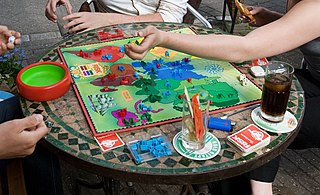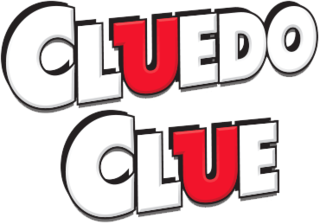Catan: Cities & Knights, formerly The Cities and Knights of Catan is an expansion to the board game The Settlers of Catan for three to four players. It contains features taken from The Settlers of Catan, with emphasis on city development and the use of knights, which are used as a method of attacking other players as well as helping opponents defend Catan against a common foe. Cities & Knights can also be combined with the Catan: Seafarers expansion or with Catan: Traders & Barbarians scenarios.

Monopoly is a multi-player economics-themed board game. In the game, players roll two dice to move around the game board, buying and trading properties, and developing them with houses and hotels. Players collect rent from their opponents, with the goal being to drive them into bankruptcy. Money can also be gained or lost through Chance and Community Chest cards, and tax squares. Players receive a stipend every time they pass "Go", and can end up in jail, from which they cannot move until they have met one of three conditions. The game has numerous house rules, and hundreds of different editions exist, as well as many spin-offs and related media. Monopoly has become a part of international popular culture, having been licensed locally in more than 103 countries and printed in more than 37 languages. As of 2015, it was estimated that there have been 275 million copies sold worldwide.

Risk is a strategy board game of diplomacy, conflict and conquest for two to six players. The standard version is played on a board depicting a political map of the world, divided into forty-two territories, which are grouped into six continents. Turns rotate among players who control armies of playing pieces with which they attempt to capture territories from other players, with results determined by dice rolls. Players may form and dissolve alliances during the course of the game. The goal of the game is to occupy every territory on the board and, in doing so, eliminate the other players. The game can be lengthy, requiring several hours to multiple days to finish. European versions are structured so that each player has a limited "secret mission" objective that shortens the game.

Cluedo, known as Clue in North America, is a murder mystery game for three to six players that was devised in 1943 by British board game designer Anthony E. Pratt. The game was first manufactured by Waddingtons in the United Kingdom in 1949. Since then, it has been relaunched and updated several times, and it is currently owned and published by the American game and toy company Hasbro.

Sorry! is a board game that is based on the ancient Indian cross and circle game Pachisi. Players move their three or four pieces around the board, attempting to get all of their pieces "home" before any other player. Originally manufactured by W.H. Storey & Co in England and now by Hasbro, Sorry! is marketed for two to four players, ages 6 and up. The game title comes from the many ways in which a player can negate the progress of another, while issuing an apologetic "Sorry!"
Risk 2210 A.D. is a 2–5 player board game by Avalon Hill that is a futuristic variant of the classic board game Risk. Risk 2210 A.D. was designed by Rob Daviau and Craig Van Ness and first released in 2001. In 2002, it won the Origins Award for "Best Science Fiction or Fantasy Board Game of 2001".

Escape from Colditz is a strategy card and dice-based board game produced by Gibsons Games of London and first released in 1973. The original game box features escape equipment on the lid and has a four section, black plastic internal game items tray. It was licensed to Parker Brothers in the US in the mid-1970s. The game was co-devised by successful escaper Pat Reid, based on the prisoner-of-war camp at Colditz Castle in Germany during World War II. The castle was built by the King of Poland and Elector of Saxony from 1694 to 1793, Augustus The Strong, upon ruins resulting from the Hussite Wars. The castle's original name was 'Koldyeze', from the Teutonic or Saxon tongue.
Battle Masters is a board game by Milton Bradley made in collaboration with Games Workshop in 1992. It is a game that simulates the type of battles as seen in Warhammer Fantasy Battle, but with much simpler game mechanics not based on its parent game. The game, like its sibling Milton Bradley/Games Workshop partnerships HeroQuest and Space Crusade, was designed by Stephen Baker, who later went on to design the popular game Heroscape.
Frag is a first-person shooter-themed board game published by Steve Jackson Games in the summer of 2001. It was developed by Steve Jackson and Philip Reed, and illustrated by Alex Fernandez.
Catan Histories: Struggle for Rome is a 2006 German-style board game based on the game mechanics of Settlers of Catan, depicting the fall of the Western Roman Empire. The game is created by Klaus Teuber, the creator of Settlers, and is published under license from Catan GmbH by Kosmos in German and Mayfair Games in English. It is the second game in the Catan Histories series of board games. Often games produced in different languages by different publishers have slight rule differences between the versions. Catan Histories: Struggle for Rome is no exception.
Civilization: The Card Game is a card game designed by Civilization IV lead designer Soren Johnson, based on Civilization IV. It was developed in 2006 by Firaxis Games, as a bonus in the Sid Meier's Civilization Chronicles boxed set, and is not available independently.
A number of related games under the Yahtzee brand have been produced. They all commonly use dice as the primary tool for game play, but all differ generally. As Yahtzee itself has been sold since 1954, the variants released over the years are more recent in comparison, with the oldest one, Triple Yahtzee, developed in 1972, eighteen years after the introduction of the parent game.

Last Night on Earth: The Zombie Game is a survival horror board game that was first published in 2007. Players can play on the Hero team or as the Zombies. A modular board randomly determines the layout of the town at the start of each game and there are several different scenarios to play. Seven supplements have been released.
The fictional universe of the Discworld novels by Terry Pratchett features a number of invented games, some of which have gone on to spawn real-world variants.
Family Game Night was an American television game show based on Hasbro's family of board games and EA's video game franchise of the same name. The show was hosted by Todd Newton. Burton Richardson announced for the first two seasons, until he was replaced by Stacey J. Aswad for the third season, and then Andrew Kishino beginning in the fourth season. The 60-minute program debuted on October 10, 2010, on The Hub, formerly Discovery Kids. The network would become Discovery Family on October 13, 2014; it was previewed on October 9, 2010, on its sister channel, TLC. Seasons 1 and 2 each contained 26(1) and 30(2) episodes. Seasons 3, 4 and 5 each contained 15 episodes. Season two premiered on Friday, September 2, 2011, and additional games were added. The games added to the second season included Cranium Brain Breaks, Green Scream, Ratuki Go-Round, Simon Flash, Operation Sam Dunk, Trouble Pop Quiz, and Spelling Bee. However, games from the previous season were still kept.

7 Wonders is a board game created by Antoine Bauza in 2010 and originally published by Repos Production. 7 Wonders is a card drafting game that is played using three decks of cards featuring depictions of ancient civilizations, military conflicts, and commercial activity. The game is highly regarded, and has won more than 30 gaming awards, including the inaugural Kennerspiel des Jahres connoisseurs' award in 2011. The game has been cited by leading designers as one of the most influential board games of the last decade.
Atmosfear: Khufu the Mummy is a video board game released in 2006 by A Couple 'A Cowboys and Flying Bark Productions as the last DVD game of the Atmosfear series. The company previously teased a Khufu-themed expansion of Nightmare at the end of Nightmare IV, though declining sales prevented it from occurring.
The Genius: Black Garnet is the third season of The Genius. It debuted on tvN on October 1, 2014.
Fireside Games is a US based board game publishing company owned and operated by Justin De Witt and Anne-Marie De Witt. Based in Austin, Texas, the company was founded in 2007. They published their first game, Castle Panic in 2009, and have published several expansions and sequels as well as other titles since then.

Broom Service is a role selection board game designed by Andreas Pelikan and Alexander Pfister, and published by Ravensburger. It won the 2015 Kennerspiel, the Spiel des Jahres connoisseurs game of the year award.








